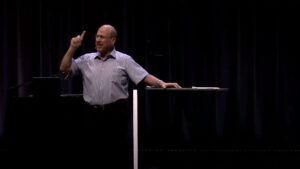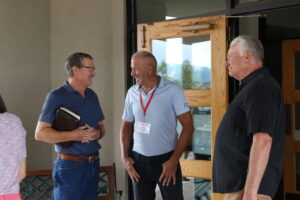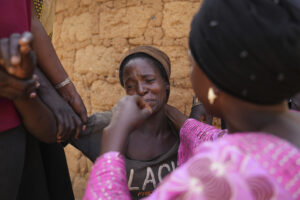
CHARLOTTE, N.C. (BP)–The tsunami in southern Asia shook people in the region to the core of their being — and God is helping them understand the depths of His love for them, a Southern Baptist missionary told International Mission Board trustees during their March 14-16 meeting in Charlotte, N.C.
Trustees also heard encouraging reports on how missions partnerships are multiplying global outreach and on innovative ways Southern Baptist congregations are getting “hands-on” involvement in reaching the least-reached. Trustee chairman Tom Hatley urged board members to feel what God feels for a lost world, while 38 new missionaries were appointed during a March 15 service at First Baptist Church in Charlotte.
HARD QUESTIONS
The massive death toll in the Dec. 26 tsunami left Muslim survivors in particular with some very difficult questions, said the veteran missionary (who is unnamed for security reasons).
“Muslims believe that everything that happens is commanded by God and that He blesses those who are faithful,” he said. “They also believe that Christians are their enemies and Muslims are their brothers.
“They are asking, ‘If we are beloved by God, why did this happen to us? If Christians are our enemies, why are they here helping us? And if Muslims are our brothers, where are they?'”
Aided by nearly $13.9 million given so far by Southern Baptists for tsunami relief in the region, Christians have come alongside survivors, helping them clean up and rebuild and doing dirty jobs some aid workers won’t do, the missionary said. Many Muslim leaders, meanwhile, say wealthy Muslim nations are doing little relief work. Christians are listening as people share their grief, with the result that bridges of understanding are being built between local Muslims and people they thought were their enemies.
“God declared that He would shake the nations for His glory,” the missionary said. “May this be that moment.”
PARTNERSHIPS MULTIPLY
Southern Baptists enjoy tremendous opportunities to partner with other conservative evangelicals who share God’s heart for a lost world, IMB President Jerry Rankin told trustees.
“I have come directly to this board meeting from a marvelous weeklong experience in Venezuela, where I delivered keynote addresses for a world missions congress with more than 1,000 registered guests,” Rankin said. “The unique missions zeal of Venezuelan Baptists is well-known, and there was a massive response to the call to missions commitment the final evening.
“I don’t think I have ever participated in such an event here in the United States or around the world,” the IMB president said. “When I witnessed the passion and commitment of Venezuelan Baptists and recalled the growing involvement in sending missionaries by others, I am reminded that we are only a part of what God is doing in our world.”
One example of partnership multiplying missions outreach is the growing vision of Korean-American Southern Baptist churches for taking the Gospel to all peoples, Rankin said.
Korean-American Southern Baptists are excited about a new level of partnership with the International Mission Board — a partnership made more meaningful because of the role Southern Baptist missionaries played in bringing the Gospel to Koreans, said David Gill, second vice president of the Southern Baptist Convention. Gill is pastor of Concord Baptist Church near San Francisco and president of the Southern Baptist Council of Korean-American Churches.
More than 800 Korean-American Southern Baptists have made commitments to overseas service as a result of seven missions rallies held in their churches over the past two years, Gill said.
‘WORKING TOGETHER’
Gill reminded the trustees of the story in Acts 3 in which Peter and John went to the temple to pray. At the gate they met a lame man who, after he was healed, entered the temple “leaping and praising God.”
Even though Peter and John were two very different people, they went to the temple together, Gill said, just as Korean-Americans and other Southern Baptists serve God together despite their differences. Gill said he personally became a Christian only because a Southern Baptist missionary to South Korea “fixed his gaze” on a teenager living on the streets and introduced him to Christ.
“How grateful I am that we are working together — Korean-American churches and many other ethnic churches — and that we have 5,000-plus missionaries out there, our missionaries, meeting one person at a time, bringing precious souls to the temple,” Gill said. “By the grace of God and the power of Jesus Christ, we go into the temple leaping and praising God — together. May the Lord continue to bless us that we will open our arms, work together and go to the uttermost parts of the world.”
With the help of Dan Moon, a Korean-American recently retired from the North American Mission Board after 33 years, Korean-American Southern Baptists and the International Mission Board continue to reach new levels of partnership, Rankin said.
Korean-American Southern Baptist churches have a vision for taking the Gospel to people groups that have yet to hear, Rankin said, and they are sharing the vision with congregations in South Korea. They also have taken the unusual step of agreeing to provide support for a Korean-American staff member at the International Mission Board to facilitate partnerships.
‘FINISHING THE TASK’
The death toll from the Asian tsunami should increase the urgency Southern Baptists feel for “finishing the task” of Christ’s Great Commission, Rankin said.
“In a matter of moments, a quarter of a million people were swept into hell,” Rankin said. “When we realize that this many people die without Christ every week in South Asia alone and that same number of people die every month of AIDS in sub-Saharan Africa, we are compelled to do whatever it takes to get the Gospel to every tribe, people, language and nation as quickly as possible.
“Of course, we realize we will never actually finish the task of missions. There will always be pockets of lostness to be evangelized,” he said. “There will always be more churches to be started, believers to be discipled and leaders to be trained. But in terms of our priority, we must very deliberately press forward to make the Gospel accessible to all peoples.”
Rankin challenged the trustees to return immediately to sending out more than 1,000 new missionaries a year — a level from which the board drew back in 2003 because of a financial shortfall. He also challenged them to draw up a budget adequate for supporting much larger numbers of personnel, with an eye toward increasing the overseas missionary force from the current 5,220 to 8,000 over the next five years.
“God is calling out more candidates than ever before, and He has given Southern Baptists far more resources than are needed to provide their support,” he said. “We need to mobilize at least 1,000 churches to be strategically involved in partnerships around the world. We should expect to generate 100,000 short-term volunteers annually, multiplying our efforts to impact the lostness and do what it takes.
“We have created a new paradigm of networking and partnership that vastly increases our potential impact. We will one day stand accountable to God for what we have done or failed to do. Will we have the resolve and the vision to stay focused and press forward to complete the task?”
‘STRATEGY COORDINATOR’ CHURCHES
A prime example of a congregation that has gotten strategically involved in missions partnership is First Baptist Church in Broken Arrow, Okla., said Phil Templin, who leads IMB work in Middle America and the Caribbean.
That church has taken on a strategy coordinator’s role — in effect becoming the “missionary” responsible for taking the Gospel to a people group to which the board otherwise would be unable to assign personnel, Templin said. Developing strategy in cooperation with IMB missionaries and regional leadership, “strategy coordinator” congregations focus on multiplying evangelism and planting churches among their people group.
For two years, First Baptist of Broken Arrow has been working in an area of northern Mexico: prayerwalking, conducting Gospel saturation projects, engaging in human needs efforts and sports evangelism ministries, building relationships. The church has maintained a constant presence in the area by rotating small teams in and out — 25 teams last year alone.
More than 275 professions of faith have been recorded, six Bible studies have been launched in four villages and five local men have begun training to lead churches, Templin reported.
‘SEEKING GOD’S HEART’
Many Southern Baptist churches will be needed to engage in such strategies if the Gospel is going to reach the unreached in this generation, chairman Tom Hatley of Arkansas said. In reaching for rapid Gospel advance, however, the board also must make sure integrity and effectiveness are not sacrificed.
“It is important for us to hold things in balance,” he said. “We must push for church-planting movements to happen, but at the same time we must be careful that we don’t stretch our outreach so far that we lose our effectiveness. There is a need for constant discipleship training, leadership training and doctrinal reinforcement as we go along in order to maintain the integrity of the reach.
“But I’ll be honest with you, what we’re talking about can’t be done unless God breaks through and does things we can’t anticipate now,” Hatley said. “This is very much in the realm of the miraculous.”
Toward that end, Hatley challenged the trustees to pray the “dangerous prayer” he has begun praying: “Lord, I want to have Your heart.”
“I love souls,” Hatley said. “But it’s a double benefit to sense God’s heart for a lost world and feel what God feels.
“We need to ask the Lord, ‘What’s it going to take for me to have Your heart? I want to not just know about You; I want to know Your heart. Lord, whatever it takes, give Me your heart.”
The next meeting of International Mission Board trustees is scheduled for May 19-21 in Midland, Texas. A missionary appointment service is planned for the Chaparral Center at Midland College on May 21.
–30–














